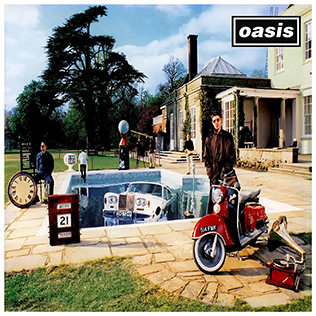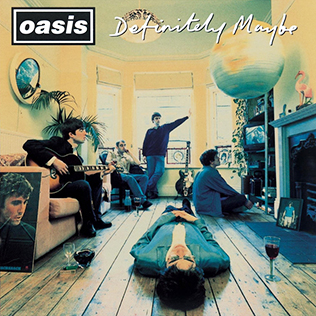All of a sudden, and mostly because Blur hadn’t swatted them out of the way at home or in the US, Oasis was the biggest band in the world. Those accolades fueled the hubris necessitating the news flash that they weren’t the Beatles. Hell, they weren’t even the Jam, even after cozying up to and getting endorsements from the similarly coiffed mod icons, and ticking off the surviving Fabs in the process. They remained, however, five of the luckiest guys in the world led by the whims of a cokehead with a marginal talent for recycling old riffs and lyrics.
Whereas (What’s The Story) Morning Glory? was, and remains, a highly catchy collection of pop songs, the much-anticipated Be Here Now still tries patience. Most of the songs are over six minutes long, and thanks to the uniform mixing—all distorted guitars and crash cymbals with feedback hum, extended endings and too much tambourine—it takes more listens than most can stand before individual songs stand out under Liam Gallagher’s whine. Only their third album, and it’s already a sad game to discern which of their own songs they’d begun to rewrite.
Yet, it’s a long time to get to even that point. “D’You Know What I Mean?” has the attitude but none of the substance of the debut, and after seven minutes it finally gives way to “My Big Mouth”—an apt title for the Gallagher brothers, to be sure, and a lame rewrite of the previous album’s title track. Noel comes to the fore on “Magic Pie”, something of a timely recapture of the Revolver era and a good distillation of the better moments of the album, but again, who in the hell besides these guys in those days thought seven-minute tracks were a good idea, with or without crash cymbals and feedback? Even Noel yells “shut up!” right before one of the final extended free-form fades.
That’s three tracks, and the listener has already sacrificed 20 valuable minutes of existence. We’ve yet to hear anything as catchy—or, ironically, as anthemic, given the length—of anything from the first two albums. That almost comes with “Stand By Me”, a lazy title and a pale remake of “Live Forever” and “Married With Children” from the first album, but goes far too long to make its point. “I Hope, I Think, I Know” is welcome given its four-minute brevity, but it’s still buried beneath a barrage of sound, and the same approach sinks “The Girl In The Dirty Shirt”, which insists on ending with a pointless electric piano vamp.
These songs are all in the same tempo, with that damn tambourine driving it along, so by the time “Fade In-Out” kicks in, nobody cares, even after it finally changes chords. Here also is when they decide to placate those with short attention spans by tossing up “Don’t Go Away”, a mope worthy of anything else in the decade, and the album’s high point. Had the album started there, the title track would have been a welcome groove, but by now it’s just more indulgence, with a stupid slide whistle to boot. By the time we’re almost at the end of this very long album, we get the Beatlesque plea in “All Around The World”, complete with Liam’s unique pronunciation of “shine”. That goes on for nine minutes, and it would be a good place to end the album, but we still have to be told that “It’s Gettin’ Better (Man!!)”, over a groove that doesn’t sound any different from the previous hour. Just to make sure, they tack on another two minutes of “All Around The World” to let everyone know just how artistic they were.
Back then, when we really, really wanted to like this album, we said, “It will be interesting to see where these guys are in five years, assuming they’re still around.” And despite all it’s problems, we still want to like Be Here Now. But boy, did they fall off the tram. The band’s attempts to come off confident only end up wary, as if they knew everybody else had figured them out. Why else would they have a tambourine cover everything up for 71 minutes?
Two decades on people are still defending this album, and they shouldn’t. Naturally, it had to be reissued with bonus discs, which did at least unearth some decent (if still too long) Noel-sung B-sides in “The Fame”, “Flashbax” and “Going Nowhere”. Acoustic takes of songs like “Stand By Me” show their obvious sources, inescapable appeal, Noel’s limited strumming ability, and the blend the brothers could create when they weren’t slapping each other around. We even get an acoustic busk of “Setting Sun”, the acid-house Chemical Brothers track that had Noel singing lead. But there’s also an entire disc of Noel’s one-man band demos of the songs that became the album, all of which portend the horror to come, and certainly the length. Had they been released back then, they might have aged better than the album itself.
Oasis Be Here Now (1997)—2½
2016 Deluxe Edition: same as 1997, plus 28 extra tracks
:format(jpeg):mode_rgb():quality(90)/discogs-images/R-2433084-1391882855-9427.jpeg.jpg)



_Morning_Glory_album_cover.jpg)
